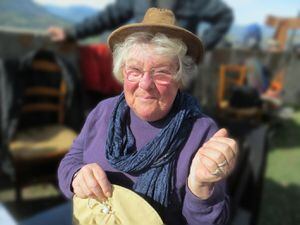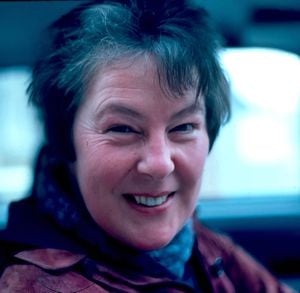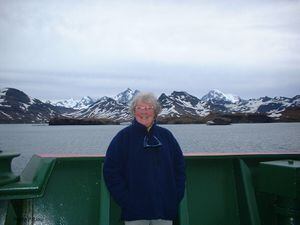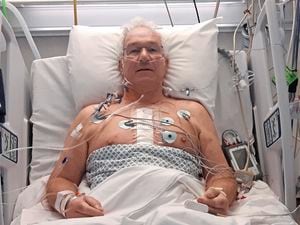Obituary: Professor Josephine Arendt
JO ARENDT (nee Wragg) may not have been among the best known of Guernsey’s residents, but in her specialist field of the pineal gland, biological rhythms and melatonin, she was a world authority, honoured in many countries and academic institutions. Many in that world have paid glowing tribute both to her professional achievements and to her warm, friendly and helpful attitude towards colleagues, collaborators and students.

Jo was born in 1941 in Newark of a Yorkshire family. Her father, Harry Wragg, was a prisoner of war in Austria at the time, having been captured in Corinth. After his return the family moved to Guernsey, where they rented Seaplane Bungalow on the cliffs of Jerbourg from Bill Green. She became a lifelong friend of Bill Green’s daughter, Maggie (now Talbot-Cull), and they indulged in much youthful mischief together.
After some years at Jerbourg, the wind on the cliffs took its toll on Jo’s mother, Margaret, and the family moved to the quieter Moulin Huet valley. There they bought and largely rebuilt the house where Jo lived until she left the island to attend university. Harry became a school teacher and eventually headmaster of St Sampson’s School. Older readers may remember the strictness of Harry’s regime (‘we had to breathe by numbers’), and Jo was also subject to his severity, ensuring her application to both school work and to other activities such as piano practice (sometimes at 5am). She also helped to reconstruct the house, becoming concrete-mixer-in-chief.
Jo’s early schooling was at Blanchelande Convent, followed by a period at St Martin’s School and then The Ladies’ College. Some scientific subjects were not covered here and she had to take these either at Elizabeth College or by correspondence course.
During her school years she spent two holiday periods at the marine laboratories of the College de France in Concarneau, Brittany, which kindled her interest in biology. She finished her schooling as head girl with six A-levels, including art – an interest which she maintained throughout her life – and was accepted at University College London to study biochemistry.

During the latter part of her undergraduate years, she met a fellow chemistry student, John Arendt, and a slow romance developed that led in 1965 to their marriage, which lasted for 58 years until her death.
On completion of her BSc degree, Jo continued in research at the Queen Charlotte’s Hospital in London. Working under an Indian supervisor, she obtained not only her doctorate but also an expertise in making curries. The couple then moved to Geneva, where Jo obtained a research post at the chemistry school of the university, working on the effect of certain tryptophan compounds on the skin colouration of the African clawed frog (xenopus laevis). These tryptophan compounds are related to melatonin, and inspired Jo to continue research in this direction.
However, funds were not available for this research and Jo was involved in a fight with the Swiss National Fund in Berne, whose reaction was fairly typical at this time (you are not Swiss, you have no establishment permit, you are a married woman, you will have children and abandon the work etc). Nevertheless, the quality of her proposals finally overcame their reluctance and in due course the necessary permits were obtained – and two children were born without the work being adversely affected.
During their 12 years in Geneva, Jo learned to love the Alps, learned to ski and often went for long walks in the mountains, but usually returned to Guernsey and the sea for holidays.
After this period, the family decided to return to the UK, where she obtained a research position at the University of Surrey in Guildford.

From her initial post as a research assistant at Geneva University, through a combination of ground-breaking research, determination and an unremitting commitment to ethical science, Jo rose to become Professor of Endocrinology, founding and leading the Human Chronobiology group at the University of Surrey.
Jo was the ‘Queen of melatonin’. This hormone, which is produced by the pineal gland in the brain, plays a central role in regulating the body’s internal ‘clock’. Jo’s first breakthrough was to find a way to accurately measure melatonin, paving the way for the rapid development of research in the field.
After returning to the UK in 1977, Jo dedicated most of her career to studying the effects of melatonin and light in humans through a series of fascinating projects. Highlights of her research included:
n Discovering and developing therapeutic use of melatonin and light to alleviate jet-lag.
n Studying and implementing ways to help blind people and shift-workers with difficulties keeping their internal rhythms in synchrony with the outside world.
n Discovering and developing the use of blue light to treat winter depression (SAD).
n Working for a number of years in collaboration with British Antarctic Survey doctors posted on Halley Base, Antarctica, studying how the polar night affects mood and sleep patterns, devising new ways to help workers adapt to unusual light conditions. She had the time of her life going ‘hands on’ with this project and made two journeys to Antarctica on the BAS ship RRS Shackleton.
She had publications (more than 300) in every major science journal, articles in every major newspaper, and wrote the standard textbook on her subject.
Jo was not particularly active politically but made her views very clear. She fought for women’s rights, and she never forgave Mrs Thatcher for her virtual destruction of the existing academic system in the universities, nor the mess produced in the education system recently in Guernsey. Above all, as a true European believing in international scientific collaboration she was unable to understand the Brexit vote and the disruption it caused in multinational projects. Unfortunately, she did not live to see the recent improvement in European scientific togetherness.
After official retirement, Jo spent most of her time at home in Torteval within view of the sea, making visits to see her children and grandchildren in the UK and in the French Alps. But she also kept in contact with her academic colleagues worldwide, was often called upon to review research papers and was involved in the organisation of an exhibition on the effects of light on people and other animals at the University of Lausanne in Switzerland.
In Guernsey she occasionally gave lectures about her work and life in Antarctica, including some in French to the Cercle Francais de Guernesey, where she was an active member.
Jo was a brilliant academic who loved being with her children and grandchildren, and also loved both her island home and the Alps. Sadly, in her later years, her health deteriorated and she had to suffer numerous operations and continuous pain. During this time, she was always supported by her family and many colleagues. She will long be remembered and missed.
u Professor Jo Arendt passed away unexpectedly on 4 September 2023, aged 82, at the Princess Elizabeth Hospital.





